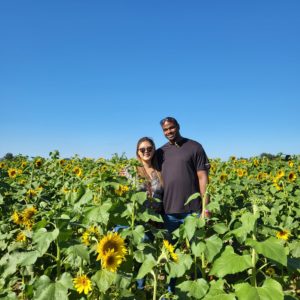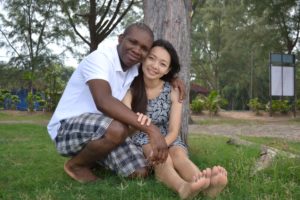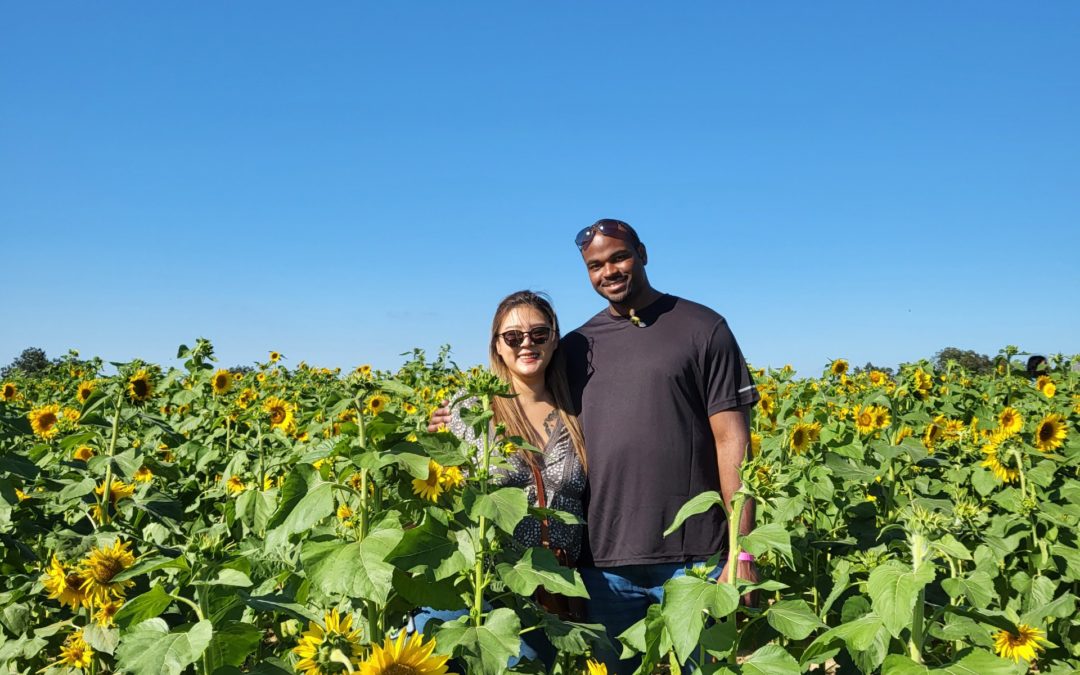By Caitlyn Chun
The Black Lives Matter (BLM) and Stop Asian Hate (SAH) movements not only underscore the complicated issue of racial relations in the US, the ingrained systematic racism but also inter-group bias and tensions between Asians and Blacks. From the LA riots to the model minority myth to Asian Americans being brutally attacked by black men during the pandemic, the relationship between the African-American and Asian-American communities has never been an easy one.
To examine the interrelation of BLM And SAH, much modern social research has been conducted to evaluate how Asians react to the BLM movement and vice versa. However, interestingly enough, there aren’t enough studies to indicate Blasians’ opinions on both movements.

Jungmi (Korean) and Robert (Black American)
Jungmi met her husband (Robert) in the city of Pyeongtaek, South Korea in 2018. Jungmi was born in Korea and grew up in Incheon, while Robert is a Puerto Rican American who grew up in the Bronx, New York. As an aircraft electrical engineer in the U.S. Air Force, Robert had been assigned to Korea for work for 2 years.
Jungmi described that she had a crush on Robert at first sight. “I relocated to Osan for my real estate business and met Robert at a Japanese-style curry restaurant in front of the Korean Osan Air Force base. It was an instant attraction, so I asked for his phone number, and we dated not long after.”
When discussing how Koreans perceive interracial relationships, Jungmi stated “Many Koreans are still prejudiced against foreigners, and many Koreans are uncomfortable with interracial relationships. Most of my friends were surprised to know that I dated and married a black guy. They had also felt sad that I had to leave Korea but were happy that I had found my love.”

Caitlyn (Malaysian Chinese) and Grant (African American)
Caitlyn and Grant, a native of Nigeria, met in 2008 in Malaysia while Grant was studying engineering at SEGI University Kota Damansara Malaysia. They met at a church and started dating in 2010. Shortly after they started dating, Grant won the green card lottery and moved to the United States. Caitlyn then went to work in Singapore. Before marriage, they were in a four-year long-distance relationship.
Grant came from a large Christian family in Nigeria, and Caitlyn is a third-generation Malaysian Chinese whose grandparents immigrated from China. Her family still maintains traditional Chinese culture to this day. Things weren’t smooth for the couple at first. Malaysia is a country of diverse ethnic groups with Indian, Chinese, and Malays being the largest three. Blacks in Malaysia have yet to be generally accepted, especially in Malaysia’s Chinese community. Grant mentioned, “Living in Malaysia as a Black person is difficult, though we are more welcomed by the Indian community, but there is still xenophobia among Chinese and Malays, so it was difficult for me to blend in.” Caitlyn mentioned that the greatest problem for Chinese and Malays to embrace outsiders is because of the language barriers and cultural differences.
When Caitlyn introduced Grant to her family, her father had reservations about the union while the mother was open-minded and wanted her daughter to be happy. Indeed, Grant’s efforts to socialize with Caitlyn’s family eventually moved the family and opened doors. Now Caitlyn’s parents look forward to his visits. They like to call him for health-related questions although they don’t speak English. Caitlyn would serve as the translator, which she enjoys, to help her parents and husband make the connection while her husband made it a necessity to learn Mandarin to communicate with his parent’s in-laws.
Grant’s family accepted their relationship with love, except for one of his aunts who wanted to arrange for a Nigerian lady of the same tribe (IBO) for him to marry because she believed that having a wife from the same tribe would make the husband happier. However, when the couple visited her during their short visit to Nigeria, she was pleased and warm to them. Grant’s family wants their children to be happy so they support whatever choice their son makes that will bring him happiness. Caitlyn indicated “My husband is very close to his grandma and mom. His family and community are blessed with so many old people, which is lovely. They accepted me very well, which made me feel very welcomed.”
In 2014, Caitlyn and Grant married. They’d spoken about the future and where they wanted to live. Because her husband was subjected to racism in Asian countries, they chose to relocate to the United States, where they would both be considered minorities but would still be accepted. After settling in the U.S., Caitlyn saw a different perspective on racism where she previously had difficulty understanding her husband’s experience with racism back in Asia. For example, when they go out together, people would choose to talk to her husband instead because they assume Caitlyn doesn’t speak English.
Although the relationship between African-American and Asian-American communities has not been an easy one due to cultural differences and different immigration journeys, both Blasian couples’ experience demonstrates that establishing a relationship is effortful, but it is achievable. Understanding, learning, and accepting one another with love and kindness are essential. Lastly to establish a sense of solidarity in our country, Black and Asian American communities must work together and have more open dialogues.

